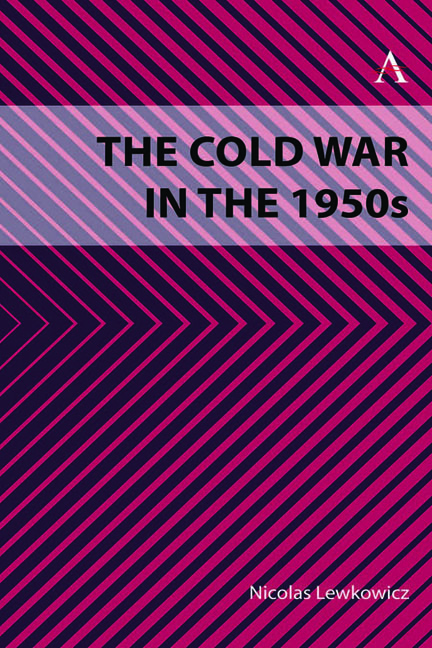Book contents
- Frontmatter
- Dedication
- Contents
- Introduction. The Unfoldment of the Cold War in the 1950s
- 1 The Ideological Construction of the Cold War in the 1950s
- 2 Faith, Dominion, and Managerialism: The Particularistic Markers of the Notion of American Exceptionalism in the 1950s
- 3 Communism, Eurasianism, and Despotism: The Markers of Soviet Foreign Policy in the 1950s
- 4 The Unidirectionality of History and Improving the World: Universalism in the Notion of American Exceptionalism
- 5 The Unidirectionality of History and Improving the World: Universalism in the Notion of American Exceptionalism
- 6 Centralization of Power and the Mastery of the International Order
- Bibliography
- Index
1 - The Ideological Construction of the Cold War in the 1950s
Published online by Cambridge University Press: 13 April 2024
- Frontmatter
- Dedication
- Contents
- Introduction. The Unfoldment of the Cold War in the 1950s
- 1 The Ideological Construction of the Cold War in the 1950s
- 2 Faith, Dominion, and Managerialism: The Particularistic Markers of the Notion of American Exceptionalism in the 1950s
- 3 Communism, Eurasianism, and Despotism: The Markers of Soviet Foreign Policy in the 1950s
- 4 The Unidirectionality of History and Improving the World: Universalism in the Notion of American Exceptionalism
- 5 The Unidirectionality of History and Improving the World: Universalism in the Notion of American Exceptionalism
- 6 Centralization of Power and the Mastery of the International Order
- Bibliography
- Index
Summary
Introduction
The ideological construction of the Cold War in the 1950s responded to the need to outline a geopolitical strategy capable of sustaining the interests of the United States and the Soviet Union. In order to accomplish that aim, the superpowers resorted to the essential aspects of their founding ideologies, namely American Exceptionalism and Eurasianism. Metapolitics is important in understanding the functioning of the international order. The actions set in motion by the superpowers in the 1950s coincided with the evolution of the strategic situation that unfolded during that decade. Cultural values served to demarcate the boundaries of rational action. What was considered to be rational differed for each superpower, for they both held different cultural values. The social practices that emerged from these cultural values responded to an essentialist ideology informed by notions of American Exceptionalism and Eurasianism, which had a significant heuristic component that allowed the leadership of both countries to deploy a workable scheme of international relations capable of bolstering their geopolitical standing. Therefore, it is important to determine the metapolitical tenets that guided the actions of the United States and the Soviet Union in world affairs during the 1950s and the manner in which they served to legitimize their system of government. These factors were of significant importance in the creation of an essentialist construction of the international order in the 1950s, which was aimed toward meeting the geopolitical needs of the United States and the Soviet Union.
The Importance of Metapolitics in the Understanding of the Evolution of the Cold War
The actions undertaken by the United States and the Soviet Union responded to essentialist accounts of the notion of civilization. The actions undertaken by the superpowers during the 1950s attest to the fact that certain practices arise as a result of long-held beliefs about the way in which a particular community should engage with the world. The “exceptionalist” attitude espoused by Washington was aimed at satisfying specific political interests. Communism succeeded in entrenching itself in power in the Soviet Union due to its quasi-religious qualities. Berdyaev states that “Russia has always been full of mystical and prophetic sects and among them there has always been a thirst for the transfiguration of life [and that] the religion of the soil is very strong in the Russian people [as] it lies deep down in the very foundations of the Russian soul.”
- Type
- Chapter
- Information
- The Cold War in the 1950s , pp. 13 - 40Publisher: Anthem PressPrint publication year: 2024

